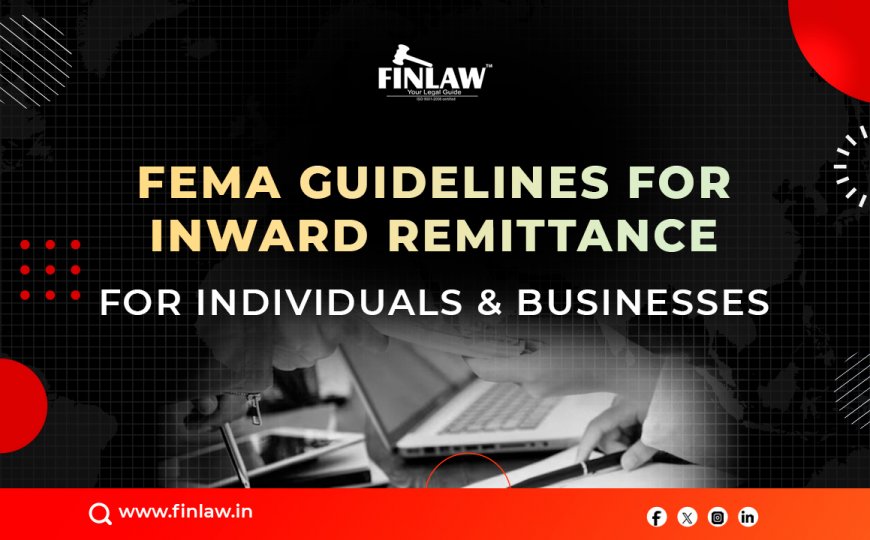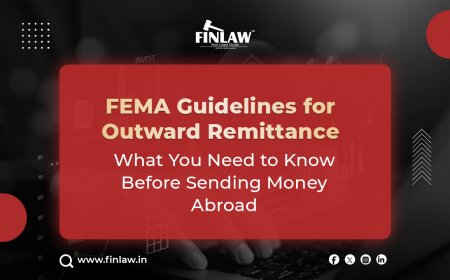FEMA Guidelines For Inward Remittance For Individuals & Businesses
Ensure FEMA compliance for inward remittances in India. Learn about regulations, tax implications, reporting requirements & best practices for 2025.

The Foreign Exchange Management Act (FEMA) governs all foreign exchange transactions in India, including inward remittances—money received from foreign sources by individuals and businesses. Understanding FEMA guidelines for inward remittance is crucial to ensure compliance with Reserve Bank of India (RBI) regulations and avoid penalties. This guide provides an in-depth look at the FEMA framework, permissible transactions, reporting requirements, and compliance measures for inward remittances in India.
What is an Inward Remittance?
An inward remittance refers to the transfer of funds from a foreign country to India. These remittances can be categorized into:
-
Personal Remittances: Money sent by Non-Resident Indians (NRIs) to family members in India.
-
Business Remittances: Payments received by Indian businesses from foreign clients, investors, or parent companies.
-
Other Inward Remittances: Transfers related to loans, gifts, salaries, pensions, and inheritances from abroad.
Regulatory Framework: FEMA & RBI Guidelines
FEMA regulates all foreign exchange transactions to ensure transparency and prevent money laundering. The RBI oversees the implementation of FEMA and sets guidelines for inward remittances.
Key FEMA Provisions For Inward Remittance
-
Authorized Dealers (ADs): Only RBI-authorized banks and financial institutions can process foreign remittances.
-
Permissible Transactions: Inward remittances must comply with FEMA regulations, ensuring they are for legitimate purposes such as family maintenance, education, business transactions, and investments.
-
Reporting & Documentation: Transactions exceeding a certain threshold must be reported to the RBI through prescribed forms like Form A2 and Foreign Inward Remittance Certificate (FIRC).
-
Tax Implications: Certain inward remittances may be subject to tax under the Income Tax Act, 1961.
-
Liberalized Remittance Scheme (LRS): The LRS framework allows individuals to receive remittances within the permissible limits without violating FEMA guidelines.
-
Foreign Exchange Management (Current Account Transactions) Rules, 2000: These rules specify the types of transactions that require prior RBI approval.
Types of Inward Remittances Allowed Under FEMA
1. Remittances for Personal Use
-
Funds sent by NRIs to family members for living expenses.
-
Remittances for medical treatment, education, and travel.
-
Gifts and donations from foreign relatives.
-
Inheritance received from family members abroad.
2. Business-Related Remittances
-
Payments for exports of goods and services.
-
Foreign investments in Indian companies.
-
Repatriation of earnings by foreign subsidiaries.
-
Foreign loans and external commercial borrowings (ECBs).
-
Royalties, commissions, and fees for technical services.
3. Other Remittance Categories
-
Remittances related to property sales by NRIs.
-
Retirement benefits and pensions received from foreign entities.
-
Salary payments to Indian employees working for overseas companies.
-
Compensation for expatriates working in India.
Process of Receiving Inward Remittances in India
-
Selection of Authorized Dealer Bank: The sender must transfer funds through an RBI-authorized bank.
-
Payment Mode & Compliance: Transactions can be processed via SWIFT, Wire Transfer, or Money Transfer Service Scheme (MTSS).
-
Document Submission: Recipients must provide KYC documents, purpose declarations, and Form A2 where required.
-
Currency Conversion & Credit to Account: The bank converts foreign currency into INR and credits the recipient’s account.
-
Issuance of FIRC: Banks issue a Foreign Inward Remittance Certificate as proof of foreign exchange receipt.
-
Compliance Check by the Bank: Banks verify the transaction details and ensure they meet FEMA requirements before crediting the funds.
FEMA Compliance Requirements For Inward Remittances
To avoid penalties and ensure seamless transactions, businesses and individuals must:
-
Use only authorized banking channels.
-
Ensure proper documentation for remittance purposes.
-
Report large transactions as per RBI’s prescribed limits.
-
Maintain a record of remittances and foreign exchange receipts for audits.
-
Check for any prior RBI approval requirements based on the nature of the transaction.
Taxation on Inward Remittances
-
NRIs sending money to family members: No tax if the amount is a gift below ₹50,000.
-
Remittances for investment purposes: Tax applicable on capital gains and dividends.
-
Foreign payments to Indian businesses: Subject to GST and TDS as per Indian tax laws.
-
Income earned from abroad: Individuals receiving salaries, pensions, or business income may need to comply with Indian income tax regulations.
Common Challenges & How to Overcome Them
-
Delays in Processing: Ensure complete documentation and compliance with RBI rules.
-
High Bank Charges: Compare exchange rates and transfer fees across banks.
-
Compliance Issues: Consult FEMA consultants or FEMA legal experts for high-value remittances.
-
Misclassification of Transactions: Businesses must ensure that remittance transactions are correctly classified to avoid unnecessary scrutiny or compliance issues.
-
Regulatory Changes: Stay updated with the latest FEMA amendments to avoid non-compliance risks.
Best Practices for Ensuring FEMA Compliance
-
Maintain detailed records of all inward remittances, including FIRC and bank statements.
-
Regularly consult FEMA consultants or financial advisors for updates on regulations.
-
Verify remittance sources to prevent involvement in money laundering activities.
-
Ensure proper use of funds to align with the stated purpose in remittance applications.
-
Set up internal compliance processes for businesses handling large international transactions.
Conclusion
Adhering to FEMA guidelines for inward remittance ensures legal and hassle-free transactions. Whether receiving money for personal or business purposes, understanding FEMA regulations, tax implications, and reporting requirements is essential. By following compliance measures and working with authorized banks, individuals and businesses can efficiently manage foreign remittances while avoiding legal complications. Staying informed about regulatory changes and consulting professionals can further enhance compliance and financial security.
What's Your Reaction?



















